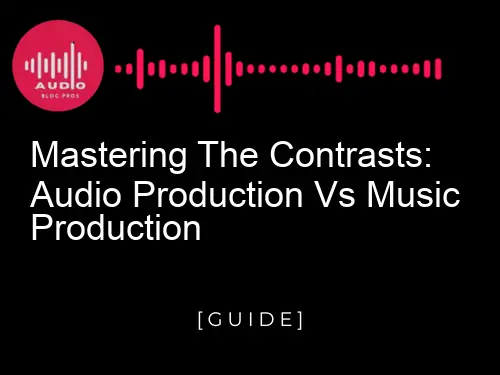When it comes to music creation, the terms “audio production” and “music production” are often used interchangeably. However, they actually refer to two different aspects of the music-making process. Audio Production vs Music Production? Knowing the differences between these two fields can be crucial for those looking to break into the industry or improve their skills. In this blog post, we’ll dive deep into the contrasts between audio production and music production, exploring their unique roles in creating a final product that truly stands out. Get ready to learn all about these two fascinating worlds and how they can work together in harmony – or create some serious dissonance – in your musical endeavors.
Table of Contents

Understanding the Fundamentals: What is Audio Production and How Does it Differ from Music Production?
Audio production and music production are two terms that are often used interchangeably, but they actually refer to different aspects of the music industry. Audio production involves the technical aspects of recording, editing, and mixing sound for various applications such as film, television, radio, and podcasts. On the other hand, music production is focused on creating and producing music for commercial release.
While both fields involve working with sound, there are fundamental differences between them. Audio production requires a deep understanding of sound engineering principles and the use of specialized equipment to capture and manipulate sound. Music production involves a more creative approach to composing and arranging music using software tools and instruments.
In terms of career opportunities, audio production offers a wider range of options beyond just music. Audio engineers can work in fields such as post-production for film or television, live sound engineering for concerts or events, or even in game development. Music producers typically work in the music industry producing albums or singles for artists.
Understanding these differences is crucial for anyone considering a career in either field. It’s important to identify your strengths and interests to determine which path is best suited for you.

Workflow Contrasts: Comparing the Creative Processes of Audio and Music Production
Workflow Contrasts: When it comes to the creative process, audio production and music production have significant differences. In audio production, the focus is more on enhancing existing sounds or recorded materials to create a polished final product. This includes tasks such as post-production editing of dialogue or sound effects for films or documentaries.
On the other hand, music production involves creating original compositions from scratch that can range from simple instrumentals to fully orchestrated tracks with vocals. The workflow in music production often begins with brainstorming ideas and lyrics before moving on to recording individual instruments and eventually piecing them together into a cohesive musical arrangement.
While both workflows require creativity and attention to detail, their processes diverge significantly based on the desired end result.
The Technical Side: Tools and Techniques Used in Audio versus Music Productions.
The technical side of audio and music production is where the two fields differ the most. Audio production focuses on capturing and manipulating sound for various purposes, such as film, television, radio, and podcasts. Audio producers use tools like digital audio workstations (DAWs), microphones, and mixing consoles to create high-quality recordings that are free from noise and distortion. They also use techniques like equalization, compression, and reverb to enhance the sound quality.
On the other hand, music production involves creating music tracks from scratch or modifying existing ones. Music producers use DAWs, virtual instruments, samplers, and synthesizers to create beats, melodies, harmonies, and arrangements. They also use effects like delay, chorus, and distortion to add character to the sound.
While there is some overlap between the tools used in audio and music production, each field has its own unique set of techniques that require specialized knowledge and skills. Aspiring producers should choose their field based on their interests and strengths in either capturing sound or creating music tracks.

Making a Career Choice Between Audio vs Music Production – Which One Suits You Best?
Understanding the Key Differences Between Audio and Music Production
Audio production and music production are two disparate fields that often get confused with one another. The key difference between audio and music production lies in their objectives. Audio production mainly revolves around producing high-quality recordings of dialogue, sound effects, narration, and other non-musical elements for film, TV shows, games or podcasts. On the other hand, music production is primarily focused on creating musical compositions using various instruments with an emphasis on melody, harmony, rhythm and lyrics to produce a finished song or album.
Knowing these fundamental differences will help you make an informed decision when choosing which field to specialize in between audio vs music production. Consider your passions and interests along with these differences before determining which career path suits you best.
Identifying Your Strengths and Interests: Choosing the Right Career Path
When it comes to choosing between audio production vs music production, it’s important to identify your strengths and interests. If you enjoy working with technology, troubleshooting equipment issues, and have a passion for creating high-quality soundscapes, then audio production may be the right fit for you. On the other hand, if you’re more interested in composing music tracks or arranging songs from scratch using digital software like FL Studio or Ableton Live, then music production could be your calling.
Ultimately, both fields require creativity and an attention to detail but differ in their technical requirements. By knowing what drives your passion for sound design or music creation you can make an informed decision about
Job Opportunities in Audio and Music Production: Which One Offers More Prospects?
If you are considering a career in audio production vs music production, it is important to understand the job opportunities available in each field. Audio engineering jobs often include positions such as recording engineer, mixing engineer, mastering engineer, and sound designer for film and television. Music production careers, on the other hand, may lead to roles like producer, composer, arranger or songwriter. While both fields offer diverse possibilities for growth and creativity, it ultimately depends on your interests and skills which one suits you best. Consider your long-term goals carefully before making a decision between these two lucrative industries.
Skills Required for Success in Audio and Music Production: Are You Ready to Take the Challenge?
To succeed in audio production vs music production, you must have a passion for music and the technical know-how to operate recording equipment. You should also be familiar with software applications used in both industries, such as Pro Tools or Logic Pro X. Good communication skills are necessary, as is the ability to work collaboratively with artists and clients. Picking one over the other depends on your interests and talents. Audio production requires more technical expertise while music production demands knowledge of musical styles, songwriting techniques, and arranging concepts. Choose based on what ignites your creativity!
Conclusion – Mastering Your Craft : Final Thoughts on Excelling in Either Audio or Music Productions
Mastering the craft of either audio production or music production is a journey that requires dedication, passion and commitment. To excel in your chosen field, you need to be open-minded, adaptable and willing to learn.
It is important to constantly improve your skills by keeping up with industry trends and technology advancements. Staying connected with other professionals in the field can also provide opportunities for growth and collaboration.
Most importantly, mastering the contrasts between audio production vs music production requires a deep understanding of both fields. While they may seem similar on the surface, each has its unique set of challenges that require specific expertise.
Whether you choose to specialize in audio production or music production ultimately depends on personal preference and career goals. Regardless of which path you take, dedicating yourself fully to your craft will lead to success and fulfillment in this exciting industry.
In conclusion, we have explored the fundamental differences between audio and music production, delved into their respective workflows and technical aspects, and even helped clarify which field best suits your career aspirations. Whether you are a budding producer or seasoned pro looking to expand your knowledge base, understanding these contrasts is key to mastering either craft. We hope this article has been insightful in helping you make informed decisions about your future endeavors.
If you enjoyed reading this content and would like to explore more informative articles on various topics related to sound engineering or music production, do check out our other resources on our website. Thank you for choosing us as your go-to source of knowledge in the world of audio!


